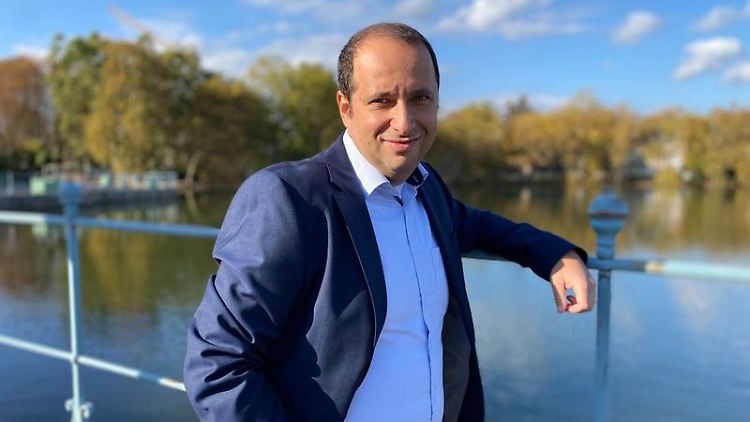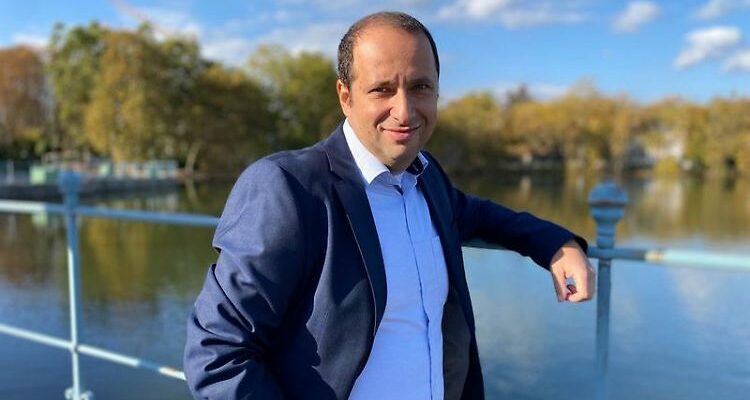Eastern Europe expert on Navalny’s death
“A clear, devastating victory for banal evil”
February 17, 2024, 10:15 a.m
The leading Russian opposition politician Alexei Navalny is dead. According to historian Alexander Friedman, it doesn’t matter whether he was killed or tortured to death. “They wanted to kill him and they succeeded,” explains the Eastern Europe expert. In the ntv.de interview he also talks about a dangerous message that the Kremlin is sending to the world – and about the helplessness of the West.
ntv.de: According to Russian authorities, Alexei Navalny allegedly suddenly felt bad while taking a walk and then lost consciousness. Do you think the Kremlin critic died without any outside influence?
Alexander Friedman: In my opinion, whether it was a natural death or whether Alexei Navalny was killed is secondary. It was the Russian state that created the conditions for him to die. We most likely won’t know the whole truth anyway because an independent investigation is simply impossible in Russia. However, from my point of view, this was clearly murder. They wanted to kill him and they succeeded.

Alexander Friedman has a doctorate in historians. He teaches contemporary history and Eastern European history at the University of Saarland and at the Heinrich Heine University in Düsseldorf.
Do you think there is a temporal connection to other events, such as the upcoming presidential election?
In my opinion, there is no particular reason why Russia should have killed Navalny now. I don’t see a clear connection with immediate political events. The temporal connection is now being emphasized primarily by the official and semi-official side in Russia. A kind of conspiracy theory that some Western secret services did everything they could to cast a shadow over the upcoming presidential election and Putin’s triumph.
So do you think there are voices claiming that Western secret services killed Navalny?
Yes, such reports are now appearing among many Russian propagandists. They want to show that the Russian government allegedly had no interest in killing Navalny and that his death only hurt them.
What message is the Kremlin sending with Navalny’s death?
We are dealing with a very clear attitude from the Russian government, namely: We don’t care about anything, we can do anything. Even in the Soviet era, Moscow couldn’t afford something like that. There were also dissidents under Soviet leaders Leonid Brezhnev and Nikita Khrushchev who died in custody. That happened. But with prominent prisoners whose fate was closely followed by the West, care was taken to ensure that nothing happened to them – especially that they did not die in custody – in order not to damage the reputation of the Soviet Union. But the message is now coming from Putin: We don’t care what you think abroad. I think getting even with Navalny was very important for Putin. What particularly strikes me about this story is that it is an obvious embodiment of the triumph of evil over good. A clear, devastating victory for evil. To paraphrase Hannah Arendt – the victory of banal evil.
Navalny’s confidant Leonid Volkov said in an interview with ntv.de last week that Navalny remained the leader of the Russian opposition even behind bars. Do you see any figure or force in Russia that now lead the oppositions and could still be dangerous for Putin?
Actually not. Alexei Navalny didn’t have a majority behind him in Russia, but he was a moral authority. This was a principled person who fought for his ideas, for his ideals. And he was willing to do the superhuman to get it. He could have stayed in London, Paris or Berlin without any problems. He would have been celebrated as a hero, the face of a new Russia. His principle was that Russia was his homeland and that he had to fight for his homeland in Russia, no matter what it cost. And Navalny’s superhuman nature, his willingness to make sacrifices, set him apart from others.
There are opposition politicians in Russia, there are democratic activists, there are many courageous people. Navalny had a choice. And his decision made him a beacon of hope. I was never his supporter and often viewed him critically. But his return to Russia after the poisoning was a superhuman act. This willingness to sacrifice surpassed everything. Such moral authorities no longer exist in Russia. Therefore, it is a dramatic loss for the democratic movement in Russia and ultimately for everyone who is democratic.
Is there now no hope for democratic-minded Russians?
At the moment I don’t see any signs of hope. Of course there will be other politicians too. But there are no people remotely comparable to Navalny. He was a tribune of the people, he could speak very well. He was a politician through and through. A personality of such stature, with such a biography, no longer exists in Russia. You cannot replace Navalny. This is a historical figure, undoubtedly a hero. But as we now see, a sad hero.
Can Navalny’s death lead to changes in Russia?
I don’t believe. Navalny supporters will of course protest abroad. Spontaneous actions may also occur in Russia from time to time. But I don’t expect anything bigger.
And will it have an impact on the Ukraine war?
No, the Kremlin will continue its war just as brutally.
What do you now expect from Western governments in response to Navalny’s death?
For the West, Navalny’s death must be a kind of wake-up moment. There are still a number of political prisoners in Russia and Belarus; these people are hardly reported on and they also die in custody. If the Kremlin leadership allows Navalny’s death – let’s call it that – then we can imagine the danger in which people who are not so well known are. For example Maria Kolesnikova – there has been no information about her for more than a year, we don’t even know what condition she is in. Just like about Viktor Babariko, Sergei Tichanovsky and many others. The West must understand which regime we are dealing with. With a regime that is completely ruthless, capable of anything and knows no limits. If I am honest, I have to say that the West is currently unable to alleviate the fate of people who suffer because of their beliefs.
Uladzimir Zhyhachou spoke to Alexander Friedman
